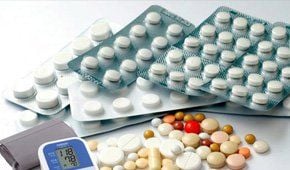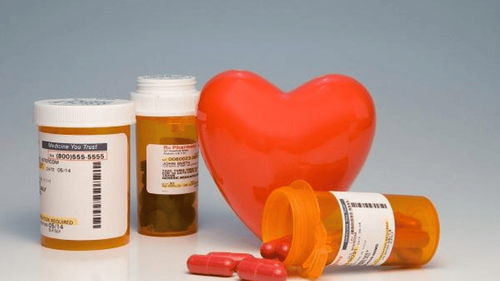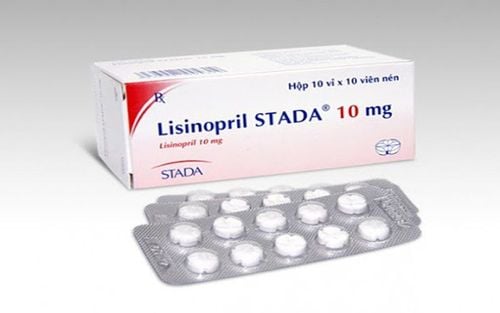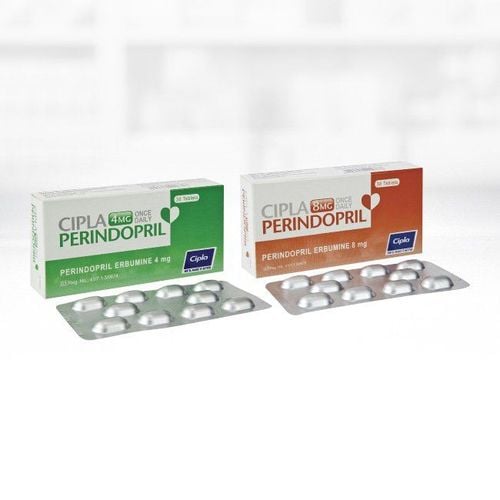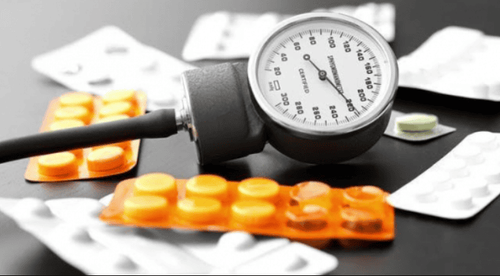This is an automatically translated article.
This article is professionally consulted by Master, Doctor Nguyen Minh Son - Interventional Cardiologist - Department of Medical Examination & Internal Medicine - Vinmec Nha Trang International General Hospital.Calcium channel blockers are used very commonly in the treatment of cardiovascular diseases, especially hypertension and angina pectoris. The drug has the effect of lowering blood pressure, antispasmodic, reducing heart rate, increasing diastolic period and reducing myocardial oxygen demand.
1. What are calcium channel blockers?
Calcium channel blockers (or calcium antagonists, English name is Calcium Channel Blocker, abbreviated as CCB) have been applied in the treatment of cardiovascular diseases since the 70s of the twentieth century. According to many evaluation studies, the ability of this class of drugs to lower blood pressure is comparable to that of ACE inhibitors.Calcium channel blockers have effects on both the arteries and the myocardium, but the effects on the arteries are thought to be stronger than on the heart. The drug causes rapid and strong vasodilatation, which easily leads to a rapid decrease in blood pressure, reflexes to increase heart rate, not beneficial for patients with myocardial ischemia. Based on molecular structure and mechanism of action, calcium channel blockers are divided into 3 groups, including:
Dihydropyridine (DHP): Acts mainly in the arteries; Phenylalkylamine: Primarily acting on the myocardium; Benzothiazepine: Has effects on both the heart muscle and the arteries. In particular, the dihydropyridine group is often preferred in the treatment of hypertension over the other two groups (non-DHP). Some common dihydropyridine drugs are:
Amlodipine; Felodipine; Isradipine; Nicardipine; Nifedipine; Nimodipine. In addition to indicated in the treatment of hypertension, calcium channel blockers are also prescribed in cases such as angina pectoris, cardiac arrhythmias.
Trắc nghiệm: Bạn có hiểu đúng về huyết áp cao không?
Huyết áp cao còn được gọi là kẻ giết người thầm lặng vì bệnh thường không có triệu chứng. Thiếu hụt kiến thức về huyết áp cao có thể làm cho tình trạng bệnh trở nên trầm trọng hơn. Dưới đây là những câu hỏi trắc nghiệm vui giúp bạn hiểu đúng về bệnh cao huyết áp.2. Mechanism of action of calcium channel blockers
2.1. For arteries Calcium channel blockers bind to the N site on the L-type calcium ion transporter channel of smooth muscle cells in the artery wall, reducing the amount of calcium ions entering the cells. Decreased intracellular calcium concentration leads to decreased contractility of smooth muscle, reduced vascular resistance, thereby reducing blood pressure and antispasmodic (coronary).
2.2. For myocardium, CCB drugs bind to calcium ion transport channels of cardiac muscle cells, reducing intracellular calcium ion concentrations, leading to decreased contractility, decreased myocardial oxygen demand, and reduced burden on cardiac muscle. heart. The drug also affects the autonomic neurons of the cardiac nodes and the purkinje conduction network. Specifically, they reduce the concentration of calcium ions in the cells, cause the cell membrane potential to change, reduce the depolarization of autonomic neurons, and increase the signal conduction time in the heart. Calcium channel blockers decrease heart rate, increase diastolic period, and decrease myocardial oxygen demand. Clinically, the DHP group is highly selective for arterial smooth muscle cells, especially with new generation drugs, so it has a therapeutic effect on hypertension and has little effect on myocardial activity. Therefore, non-DHP drugs are indicated for the treatment of angina pectoris due to the effect of reducing contractility, reducing work of the heart muscle, increasing the diastolic period, and preventing coronary artery spasm. In addition, because the drug has the effect of changing the cell membrane potential, reducing the ability of cells to self-depolarize, especially for peripheral tissue cells, so it is also applied in the treatment of arrhythmias (in the atria). .
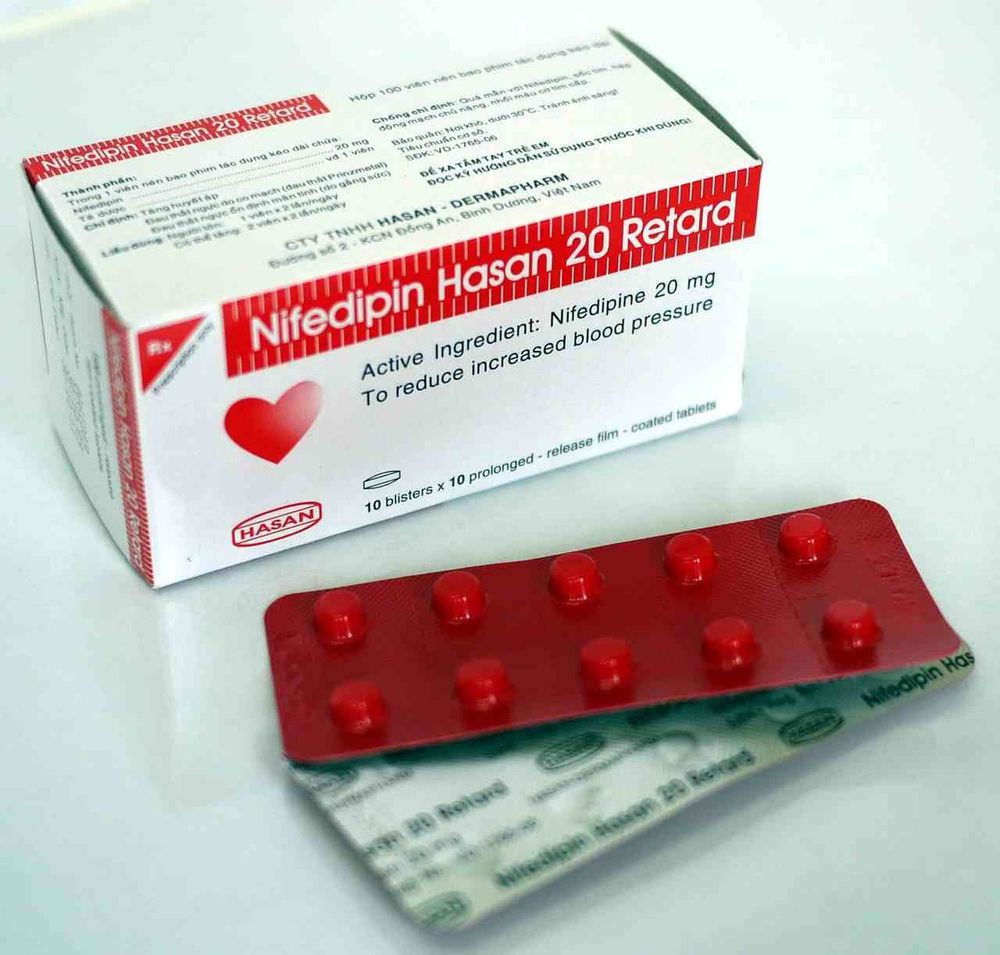
Thuốc Nifedipine thuộc nhóm dihydropyridine, thường được dùng trong bệnh tim mạch
3. Typical side effects of calcium channel blockers
Calcium channel blockers can cause some side effects, such as:Headache, dizziness; Nausea; Constipation ; Heartburn; Allergies, skin rashes; Facial flushing; Be swelled the leg; Tired. In some cases, some calcium channel blockers have the potential to lower a patient's blood sugar. Some long-term side effects will be harmful to health.
In fact, calcium channel blockers can interact with some medications or supplements. Therefore, patients should inform their doctor about any medications and supplements, vitamins or herbs they are taking. This will help reduce the risk of side effects caused by calcium antagonists.
On the other hand, while taking calcium channel blockers, patients should abstain from grapefruit, including fruit or juice. Grapefruit can interfere with the excretion of drugs, affecting the concentration of drugs in the body. If you like to eat this type of food, take the medicine at least 4 hours before eating.

Đau đầu, chóng mặt là một trong những tác dụng phụ điển hình của thuốc chẹn kênh canxi
4. Comparison of calcium channel blockers with other groups
Each group of drugs has a different mechanism of action, and has different benefits and disadvantages, no group is superior to the other. For example, with the same effect in the treatment of hypertension, calcium channel blockers are superior to beta blockers for stroke prevention, but beta blockers are superior to calcium channel blockers and other groups for heart failure prevention. Therefore, for hypertensive patients with other cardiovascular disease risk factors, the choice of medication should be based on the results of the assessment of these risk factors and the actual clinical situation.In summary, calcium channel blockers are considered safe and effective antihypertensive drugs. However, due to differences in the mechanism of action, pharmacokinetics and risk of side effects, the choice of cardiovascular treatment options for patients will be different on a case-by-case basis.
Patients with hypertension or cardiovascular diseases can choose to be treated at Vinmec International General Hospital. Here gathers a team of Cardiologists including professors, doctors, masters, specialists 2 experienced, with great reputation in the field of medical treatment, surgery, cardiac catheterization. intervention. Vinmec also focuses on applying advanced techniques in the diagnosis and treatment of cardiovascular diseases, using a system of modern medical equipment that meets international standards.
Master - Doctor Nguyen Minh Son has many years of experience in the diagnosis and treatment of cardiovascular diseases; especially strong in transthoracic echocardiography in the field of internal medicine and interventional cardiology. Perform other non-invasive functional investigations in the diagnosis and treatment of cardiovascular diseases. Currently working as a treating doctor at Cardiology Center, Department of Examination & Internal Medicine, Vinmec Nha Trang International Hospital since February 2019.
Please dial HOTLINE for more information or register for an appointment HERE. Download MyVinmec app to make appointments faster and to manage your bookings easily.
Reference source: Documents of the Vietnam Society of Cardiology




